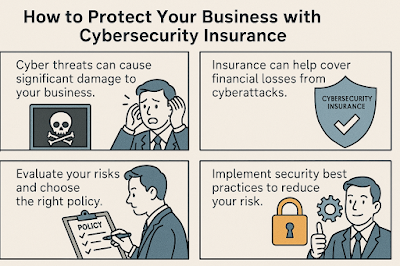How to Protect Your Business with Cybersecurity Insurance
How to Protect Your Business with Cybersecurity Insurance
In today’s digital world, small and large businesses alike are vulnerable to cyber threats.
From ransomware attacks to phishing schemes, data breaches can cause significant financial losses and damage your reputation.
That’s why having a strong cybersecurity plan—and backing it up with insurance—is more critical than ever.
📌 Table of Contents
- What Is Cybersecurity Insurance?
- Why Is It Important for Businesses?
- What Does Cyber Insurance Cover?
- How to Choose the Right Policy
- Best Practices to Lower Your Premium
- Recommended Resources
🔍 What Is Cybersecurity Insurance?
Cybersecurity insurance, also known as cyber liability insurance, helps businesses recover from the financial impact of cyber incidents.
It provides coverage for expenses like data recovery, legal fees, customer notification, and business interruption caused by cyberattacks.
💡 Why Is It Important for Businesses?
Even with firewalls and antivirus software, no system is entirely immune to hacking or malware.
In 2023, IBM reported that the average cost of a data breach was $4.45 million globally.
For small businesses, even a minor breach could be devastating.
Cybersecurity insurance can be the safety net that saves your business from going under after an attack.
🛡️ What Does Cyber Insurance Cover?
Coverage varies by provider, but most policies include:
Data Breach Costs: Notifying customers, offering credit monitoring, and investigating the breach.
Legal Expenses: Covering lawsuits, regulatory fines, and legal defense.
Business Interruption: Loss of income due to downtime or recovery period.
Cyber Extortion: Ransom payments and negotiation costs.
Reputation Repair: PR services and brand management.
📄 How to Choose the Right Policy
Start by evaluating the unique risks your business faces based on size, industry, and technology use.
Compare policies and look for the following features:
1. Clear coverage limits: Make sure the policy covers both first-party and third-party costs.
2. Fast response times: Time is crucial after an attack. Look for insurers with a rapid claims process.
3. Customized policies: Choose a provider that tailors coverage based on your risk level.
📉 Best Practices to Lower Your Premium
Insurance companies often offer better rates to companies that demonstrate good cybersecurity hygiene.
To reduce your premium, follow these best practices:
Install multi-factor authentication (MFA) across all systems.
Encrypt sensitive data both in transit and at rest.
Provide regular cybersecurity training for employees.
Update software and systems frequently.
Back up data regularly and test recovery processes.
🌐 Recommended Resources
Looking for more details on cyber protection and insurance? These trusted resources offer expert insights:
🚀 Final Thoughts
Cybersecurity insurance is no longer a luxury—it’s a necessity for any modern business.
While you can't always prevent a cyberattack, you can prepare for the financial impact with the right protection.
Take time to evaluate your risks, invest in strong cybersecurity practices, and choose an insurance policy that fits your business model.
When disaster strikes, you'll be glad you did.
Keywords: cybersecurity insurance, small business cyber protection, cyber liability coverage, data breach insurance, business insurance
